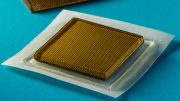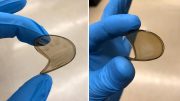Researchers have made significant advances in memristor technology, enhancing its precision and efficiency. This innovation promises to bridge the gap between analog and digital computing, offering faster, more energy-efficient processing suitable for AI, machine learning, and beyond. Credit: SciTechDaily.com
Design combines the best of digital and analog computing and delivers >10x energy efficiency.
While most of computing in the world is still digital, the data around us is captured in analog via sensors–images through cameras, temperature, and sound, for example and has to be converted in a digital form for precision. But imagine an autonomous vehicle that needs to capture what’s on the road etc. and then make decisions instantaneously, this data needs to be converted—very quickly with low energy and high precision. What if newly designed analog chips could provide the precision of digital computing with the energy-saving and high-speed advantages of analog computing?
Advances in Memristor Technology
If a computer chip is made up of various circuits, a memristor is a relatively small-sized component of a circuit that stores and processes data very efficiently. In a previous paper from the lab of USC Viterbi School of Engineering Electrical and Computer Engineering professor, J. Joshua Yang, researchers were able to tweak a memristor to achieve unprecedented precision.
His lab within USC Viterbi and its School of Advanced Computing is focused on developing devices for computing. The lab has designed a new circuit and architecture to achieve even higher precision with the same memristors, which could greatly extend the applications of such technology beyond the traditional low-precision territory, such as neural networks. Moreover, says Yang, this innovation is applicable to other types of memory technologies as well, including magnetic memories that use the same device as the read-head of the magnetic hard disk drives, and phase change memories that use the same material as the compact discs (CDs).
Enabling Faster, More Efficient Computing
Normally, says Yang, it is very challenging to quickly program an analog device precisely to a target value. Yang’s lab developed circuit architecture and corresponding algorithm to do exactly that. This innovation makes analog computing using analog devices much more attractive for many applications.
Yang says it has, ‘higher efficiency and higher speed with accuracy of the digital systems.”
This type of improvement is critical, says Yang as such innovations can be applied to train neural networks which are needed to develop artificial intelligence (AI) and machine learning (ML) but thus far can only be done in very expensively with digital systems. The innovation will also enable new applications beyond AI and ML, such as scientific computing for such as weather forecasting.
Reference: “Programming memristor arrays with arbitrarily high precision for analog computing” by Wenhao Song, Mingyi Rao, Yunning Li, Can Li, Ye Zhuo, Fuxi Cai, Mingche Wu, Wenbo Yin, Zongze Li, Qiang Wei, Sangsoo Lee, Hengfang Zhu, Lei Gong, Mark Barnell, Qing Wu, Peter A. Beerel, Mike Shuo-Wei Chen, Ning Ge, Miao Hu, Qiangfei Xia and J. Joshua Yang, 22 February 2024, Science.
DOI: 10.1126/science.adi9405
The paper, “Programming memristor arrays with arbitrarily high precision for analog computing” was featured in Science, was written with Wenhao Song , Ye Zhuo, Peter A. Beerel, Mike Shuo-Wei Chen at USC, along with Qiangfei Xia at University of Massachusetts, Mark Barnell and Qing Wu at Air Force Research Lab, Information Directorate, Rome, NY, USA. The research was conducted with Miao Hu, Gleen Ge, and other engineers of TetraMem Inc., a startup co-founded by Yang.
The previous paper on which this research builds on previous paper in this lab was featured in Nature.









Be the first to comment on "Efficient AI Ahead: USC’s Memristor Breakthrough Transforms Analog Computing"